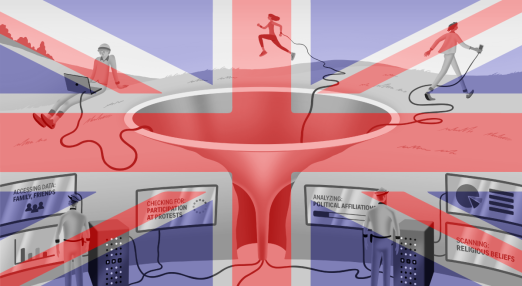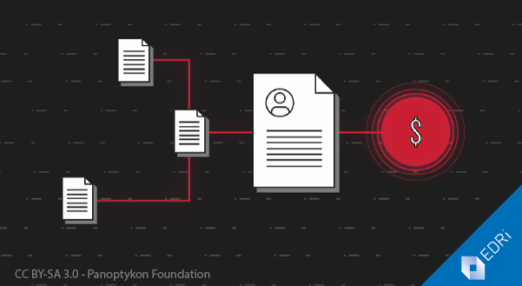ORG
Filter by...
-

Snowden revelations: ten years on
Ten years ago, the first revelations about US mass surveillance were published in the UK and USA. The revelations swiftly widened to encompass details about the role of the UK’s GCHQ (Government Communications Headquarters) in the global gathering of vast amounts of communications data.
Read more
-

The UK Data Reform Bill and the British Bill of Rights: a tragedy in two acts
The dust hasn’t settled since plans to undermine everyone’s right to data protection were announced, but the UK Government are at it again. Plans to ditch the Human Rights Act in the UK were just unveiled, in a combined effort to steamroll the rule of law and the freedoms we have always taken for granted. EDRi member Open Rights Group explains how the impact of this constitutional butchery reverberates in data protection, and why both the Data Reform Bill and the Bill of Rights follow a common thread.
Read more
-

Panoptykon files complaints against Google and IAB
On the International Data Protection Day, 28 January 2019, EDRi member Panoptykon filed complaints against Google and the Interactive Advertising Bureau (IAB) under the General Data Protection Regulation (GDPR) to the Polish Data Protection Authority (DPA). The complaints are related to the functioning of online behavioural advertising (OBA) ecosystem.
Read more
-

Internet clampdown – convenient distraction from political turmoil?
There was unforeseen result in the United Kingdom general election. The Conservative Party was expected to increase their majority in government. However, it failed to achieve a majority and was forced to seek an alliance with the controversial Democratic Unionist Party (DUP) in order to form a government.
Read more
-

UK government pushes for companies to weaken encryption
The terrorist attack in Manchester on 22 May has led to a relaunch of the encryption debate in the UK. In December 2016, the UK parliament passed the Investigatory Powers Act. This wide-ranging surveillance law gives government ministers the power to issue Technical Capability Notices (TCNs), which can force companies to modify their products.These powers could […]
Read more
-

UK government attacks encryption … again
In the aftermath of the attack in London in March 2017, the UK government has, again, indicated that it wants to force companies to weaken encryption. The government wants to be able to access messages sent via services that use end-to-end encryption. The Home Secretary Amber Rudd stated on BBC One’s Andrew Marr Show that it […]
Read more
-

Proposed Espionage Act threatens free speech in the UK
The UK’s Law Commission has announced proposals that could mean journalists and whistleblowers are treated as spies if they “handle” official data. The ongoing open public consultation on the protection of official data, run by the Law Commission, suggests that the crime of espionage is changed so that it is “capable of being committed by […]
Read more
-

How digital rights in the UK will be affected by Brexit
The United Kingdom’s vote to leave the EU means that inhabitants of the country no longer have a clear idea what levels and kinds of protection of digital rights they will have in the future. Nearly all the relevant law is European. A lot depends on the kind of model of leaving the EU that […]
Read more
-

Hungarian data retention case: ORG, PI & scholars file amicus briefs
EDRi member Open Rights Group (ORG), Privacy International and a group of internationally acknowledged experts filed amicus curiae briefs with the Hungarian Constitutional Court. The case has been brought by the Hungarian Civil Liberties Union (HCLU) against two major service providers, in an attempt to force the Hungarian Constitutional Court to repeal the Hungarian Electronic […]
Read more
-

Almost one in five sites blocked by filters in the UK
EDRi member Open Rights Group’s (ORG) Blocked project reveals that nearly one in five of the most popular websites are blocked by at least one of the “voluntary” filters implemented by Internet Service Providers (ISPs) in the United Kingdom when strict filtering settings are used. The UK ISPs filter and block the sites by default. […]
Read more
-

UK: Emergency legislation on data retention pushed through
Faced with a lawsuit from NGOs challenging the legality of its data retention regulations (which are based on the data retention directive the European Court of Justice found unlawful in April 2014), the UK government brought in emergency legislation, a Data Retention and Investigatory Powers Bill (DRIP), to not only declare data retention to be […]
Read more
-
ORG and DigiGes launch campaigns for the European elections
EDRi members Open Rights Group (ORG), UK, and Digitale Gesellschaft (DigiGes), Germany, have launched their campaigns for the WePromise.eu initiative for the European elections that will be held 22-25 May 2014. During the next term, European Parliament will face many crucial decisions concerning digital policy, ranging from privacy, copyright and net neutrality to mass surveillance. […]
Read more
